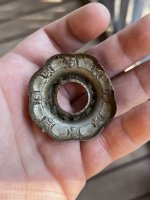piratediver
Sr. Member
I just found out about this conference this morning, it starts today in D.C.!
Pirate Diver
Keeping the Lid on Davy Jones' Locker: The Protection of Underwater Cultural Heritage from Titanic to Today
REGISTER NOW
8:30 AM - 9:00 AM Registration
A continental breakfast will be provided.
9:00 AM - 9:15 AM Welcome and Introductions
Diane Penneys Edelman, President, Lawyers' Committee for Cultural Heritage Preservation; Director of International Programs and Professor of Legal Writing, Villanova University School of Law
Paul Edmondson, Vice President and General Counsel, National Trust for Historic Preservation
9:15 AM - 10:45 AM The Importance of Underwater Cultural Heritage and the Threats Facing It
The first panel will introduce "underwater cultural heritage" (UCH). What is it? Why should we care about it? What are the manmade threats facing it, ranging from commercial salvage, to shoddy excavation, to outright looting? And how can we work together to best preserve it? This panel will also present case studies of cooperation in protecting and managing UCH, including the Nuestra Señora de las Mercedes, also referred to as the "Black Swan" by Odyssey Marine Exploration in its admiralty claim.
Richard Leventhal, Director, Penn Cultural Heritage Center (Moderator)
Elizabeth Greene, Associate Professor, Brock University
Caroline Blanco, Assistant General Counsel, National Science Foundation
James Goold, Of Counsel, Covington and Burling
Carla Mattix, Attorney, National Park Service
David Conlin, Chief of Submerged Resources Unit, National Park Service
10:45 AM - 11:00 AM Break
11:00 AM - 12:30 PM The 10th Anniversary of the 2001 UNESCO Convention on the Protection of Underwater Cultural Heritage: Is It Working?
The second panel will tell the story of the 2001 UNESCO Convention on the Protection of Underwater Cultural Heritage. The panelists will discuss its creation and implementation over the last decade. They will also address how party and non-party states can cooperate to preserve UCH in a matter consistent with both international customary law, as well as international agreements, such as the Law of the Sea Convention.
Ole Varmer, Attorney, National Oceanic and Atmospheric Administration (Moderator)
James Nafziger, Professor, Willamette University College of Law
Ulrike Guerin, Secretariat of the 2001 UNESCO Convention
Guillermo Corral, Cultural Counselor, Embassy of Spain
Joel Gilman, Solicitor, Heritage Council of Western Australia
Mary Lou Doyle, Manager of Government Relations and Legislation, Parks Canada
Sarah Dromgoole, Professor, University of Nottingham
12:30 PM - 1:00 PM Break
A boxed meal will be provided for the luncheon address.
1:00 PM - 2:00 PM Titanic Exploration, Recovery, and Research: Past, Present, and Future
The 100th anniversary of Titanic is an appropriate time to review what has happened to the wreck since its 1985 discovery. It is also an ideal time to explore recent initiatives to better understand the wreck as an archaeological, historical, and memorial site, as well as to discuss how to manage and protect the site in the future. Dr. Delgado has been involved with Titanic since 1986 in various aspects of his career as an archaeologist, museum director, and Federal official, participating in a 2000 dive to Titanic and serving as chief scientist for the 2010 scientific mapping expedition. He was also one of the authors of the Titanic Treaty. In this presentation, he will specifically address a plan of action for Titanic that addresses the needs of the public, private enterprise, and the preservation community.
James P. Delgado, Director, Maritime Heritage Program, National Oceanic and Atmospheric Administration
2:00 PM - 3:30 PM Titanic at 100: A Case Study of Cooperation on Salvage in a Manner Consistent with the 2001 UNESCO Convention and the Law of the Sea
Using Titanic as a case study, the third panel will examine the controversy surrounding the recovery of underwater cultural heritage. Can UCH be commercially salvaged in accordance with scientific standards and international law? If so, how? The panelists will also investigate the legal implications of the Titanic's 100th anniversary, which will bring it under the protection of the 2001 UNESCO Convention, and the recent court award of the Titanic Collection to salvors. Finally, they will address the application of existing U.S. law as a deterrent for the looting, unwanted salvage, and trafficking of UCH like that from Titanic.
Caroline Blanco, Assistant General Counsel, National Science Foundation (Moderator)
Ole Varmer, Attorney, National Oceanic and Atmospheric Administration
Mariano Aznar Gómez, Chair of Public International Law, University Jaume I
David Bederman, Professor, Emory School of Law
Laura Gongaware, Tulane Law School
Michael Marous, Assistant U.S. Attorney, Department of Justice
Bonnie Magness-Gardiner, Program Manager, Art Theft Program, Federal Bureau of Investigation
3:30 PM - 3:45 PM Break
3:45 PM - 5:15 PM Moving Forward
During the last panel --- a moderated discussion including open questions from the audience --- the day's panelists will address other challenges facing underwater cultural heritage and then suggest recommendations for moving forward.
Ole Varmer, Attorney, National Oceanic and Atmospheric Administration (Moderator)
5:15 PM - 6:00 PM Closing Reception
LCCHP welcomes all panelists and attendees to join us for a closing reception.
RETURN TO THE MAIN CONFERENCE PAGE AND REGISTER
Lawyers' Committee for Cultural Heritage Preservation © 2000-2010. All rights reserved.
1785 Massachusetts Ave. NW, Washington, DC 20036-2117
Site Map • Terms of Use • Contact Us
Sign up for Citations, our free e-newsletter, to receive the latest information on our organization, legal developments, upcoming events, and more.
Sign Up Here
Powered by Wild Apricot membership software - website software for non profit, club and association management
Includes website builder, membership management, event registration, online fundraising & membership website
Pirate Diver
Keeping the Lid on Davy Jones' Locker: The Protection of Underwater Cultural Heritage from Titanic to Today
REGISTER NOW
8:30 AM - 9:00 AM Registration
A continental breakfast will be provided.
9:00 AM - 9:15 AM Welcome and Introductions
Diane Penneys Edelman, President, Lawyers' Committee for Cultural Heritage Preservation; Director of International Programs and Professor of Legal Writing, Villanova University School of Law
Paul Edmondson, Vice President and General Counsel, National Trust for Historic Preservation
9:15 AM - 10:45 AM The Importance of Underwater Cultural Heritage and the Threats Facing It
The first panel will introduce "underwater cultural heritage" (UCH). What is it? Why should we care about it? What are the manmade threats facing it, ranging from commercial salvage, to shoddy excavation, to outright looting? And how can we work together to best preserve it? This panel will also present case studies of cooperation in protecting and managing UCH, including the Nuestra Señora de las Mercedes, also referred to as the "Black Swan" by Odyssey Marine Exploration in its admiralty claim.
Richard Leventhal, Director, Penn Cultural Heritage Center (Moderator)
Elizabeth Greene, Associate Professor, Brock University
Caroline Blanco, Assistant General Counsel, National Science Foundation
James Goold, Of Counsel, Covington and Burling
Carla Mattix, Attorney, National Park Service
David Conlin, Chief of Submerged Resources Unit, National Park Service
10:45 AM - 11:00 AM Break
11:00 AM - 12:30 PM The 10th Anniversary of the 2001 UNESCO Convention on the Protection of Underwater Cultural Heritage: Is It Working?
The second panel will tell the story of the 2001 UNESCO Convention on the Protection of Underwater Cultural Heritage. The panelists will discuss its creation and implementation over the last decade. They will also address how party and non-party states can cooperate to preserve UCH in a matter consistent with both international customary law, as well as international agreements, such as the Law of the Sea Convention.
Ole Varmer, Attorney, National Oceanic and Atmospheric Administration (Moderator)
James Nafziger, Professor, Willamette University College of Law
Ulrike Guerin, Secretariat of the 2001 UNESCO Convention
Guillermo Corral, Cultural Counselor, Embassy of Spain
Joel Gilman, Solicitor, Heritage Council of Western Australia
Mary Lou Doyle, Manager of Government Relations and Legislation, Parks Canada
Sarah Dromgoole, Professor, University of Nottingham
12:30 PM - 1:00 PM Break
A boxed meal will be provided for the luncheon address.
1:00 PM - 2:00 PM Titanic Exploration, Recovery, and Research: Past, Present, and Future
The 100th anniversary of Titanic is an appropriate time to review what has happened to the wreck since its 1985 discovery. It is also an ideal time to explore recent initiatives to better understand the wreck as an archaeological, historical, and memorial site, as well as to discuss how to manage and protect the site in the future. Dr. Delgado has been involved with Titanic since 1986 in various aspects of his career as an archaeologist, museum director, and Federal official, participating in a 2000 dive to Titanic and serving as chief scientist for the 2010 scientific mapping expedition. He was also one of the authors of the Titanic Treaty. In this presentation, he will specifically address a plan of action for Titanic that addresses the needs of the public, private enterprise, and the preservation community.
James P. Delgado, Director, Maritime Heritage Program, National Oceanic and Atmospheric Administration
2:00 PM - 3:30 PM Titanic at 100: A Case Study of Cooperation on Salvage in a Manner Consistent with the 2001 UNESCO Convention and the Law of the Sea
Using Titanic as a case study, the third panel will examine the controversy surrounding the recovery of underwater cultural heritage. Can UCH be commercially salvaged in accordance with scientific standards and international law? If so, how? The panelists will also investigate the legal implications of the Titanic's 100th anniversary, which will bring it under the protection of the 2001 UNESCO Convention, and the recent court award of the Titanic Collection to salvors. Finally, they will address the application of existing U.S. law as a deterrent for the looting, unwanted salvage, and trafficking of UCH like that from Titanic.
Caroline Blanco, Assistant General Counsel, National Science Foundation (Moderator)
Ole Varmer, Attorney, National Oceanic and Atmospheric Administration
Mariano Aznar Gómez, Chair of Public International Law, University Jaume I
David Bederman, Professor, Emory School of Law
Laura Gongaware, Tulane Law School
Michael Marous, Assistant U.S. Attorney, Department of Justice
Bonnie Magness-Gardiner, Program Manager, Art Theft Program, Federal Bureau of Investigation
3:30 PM - 3:45 PM Break
3:45 PM - 5:15 PM Moving Forward
During the last panel --- a moderated discussion including open questions from the audience --- the day's panelists will address other challenges facing underwater cultural heritage and then suggest recommendations for moving forward.
Ole Varmer, Attorney, National Oceanic and Atmospheric Administration (Moderator)
5:15 PM - 6:00 PM Closing Reception
LCCHP welcomes all panelists and attendees to join us for a closing reception.
RETURN TO THE MAIN CONFERENCE PAGE AND REGISTER
Lawyers' Committee for Cultural Heritage Preservation © 2000-2010. All rights reserved.
1785 Massachusetts Ave. NW, Washington, DC 20036-2117
Site Map • Terms of Use • Contact Us
Sign up for Citations, our free e-newsletter, to receive the latest information on our organization, legal developments, upcoming events, and more.
Sign Up Here
Powered by Wild Apricot membership software - website software for non profit, club and association management
Includes website builder, membership management, event registration, online fundraising & membership website






